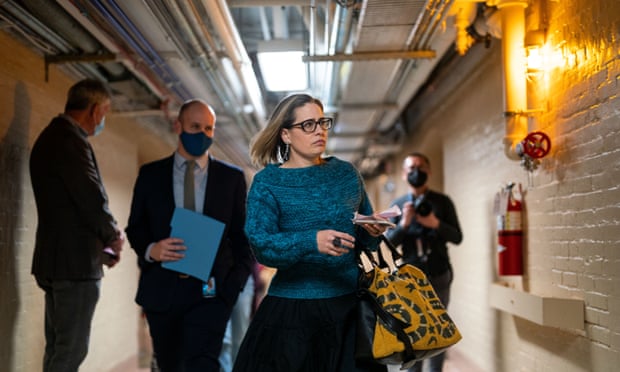Hear why Sinema is concerned about eliminating filibuster Key moderate Democrat Sen. Kyrsten Sinema (D-AZ) says she continues to back her party's election legislation, but that she does not support eliminating the filibuster.
How Biden swung for filibuster reform — and missed with Manchin and Sinema Senate Majority Leader Chuck Schumer said the chamber would postpone a previously scheduled recess and return Tuesday to begin debating the election and voting legislation. ......... Senate Majority Leader Chuck Schumer said Thursday evening that the chamber would postpone a previously scheduled recess and return Tuesday to begin debating the election and voting legislation. He also reiterated his pledge that the Senate will vote on rules changes if Republicans block moving to final passage, as they're expected to do. Despite Biden's visit and next week's floor showdown, Manchin and Sinema are only digging in. ............ Biden had prepared remarks for the meeting but instead opted to speak off-the-cuff, recalling that he got the late Sen. Strom Thurmond (R-S.C.) to support the Voting Rights Act while they were both in Congress and arguing that a majority of today's Republicans today wouldn’t support that landmark bill. Biden told senators he couldn’t remember a time in U.S. history where a party had been so enthralled to one person as the GOP is to former President Donald Trump. ............. Unlike Manchin, Sinema did not ask Biden a question during his roughly 90-minute visit with the caucus. There might not have been much to say:
Sinema made crystal-clear during her speech that while she supports voting and election reform bills, she “will not support separate actions that worsen the underlying disease of division infecting our country.”
.......... Even with Sinema and Manchin’s latest statements, Schumer is giving no indication he's backing down from his push for a floor vote on rules changes, even if it means dividing his 50-member caucus. White House press secretary Jen Psaki said that the White House would keep fighting. But Psaki added that it's up to Schumer to decide what the next steps are for a bill the party has portrayed, in stark terms, as essential to save American democracy. ........ Sen. Chris Van Hollen (D-Md.) argued that the upper chamber already empowers the minority, given that states like Wyoming have as many senators as California. And Sen. Patrick Leahy (D-Vt.), the party's most senior senator, asked why the caucus couldn’t unite around weakening the filibuster.Sinema says no to filibuster reform to scuttle Democrats’ voting rights hopes Arizona senator says she will not support filibuster changes in floor speech condemned by voting rights activists .......... Even before the US president arrived on Capitol Hill on Thursday afternoon to join Democratic senators for their regular lunch gathering, in a diplomatic public offensive, Sinema of Arizona bluntly reiterated that she would not support any change to filibuster rules to get voting rights passed...... Her surprise last-minute move with a speech effectively killed her party’s hope of passing the most sweeping voting rights protections in a generation. .......... Sinema had taken to the Senate floor around noon opposing any changes to the filibuster, the Senate rule that requires 60 votes to advance legislation, while Democrats currently hold a bare majority in the 100-seat chamber and two voting rights bills are stalled. “While I continue to support these [voting rights] bills, I will not support separate actions that worsen the underlying disease of division infecting our country,” she said. She added: “We must address the disease itself, the disease of division, to protect our democracy, and it cannot be achieved by one party alone. It cannot be achieved solely by the federal government. The response requires something greater and, yes, more difficult than what the Senate is discussing today.” .......
Sinema’s speech came at an extremely perilous moment for US democracy. Republican lawmakers in 19 states have enacted 34 new laws, according to the Brennan Center for Justice, that impose new voting restrictions.
............ They have also passed a slew of bills that seek to inject more partisan control into election administration and the counting of votes, an unprecedented trend experts are deeply concerned about and call election subversion. Many of those measures have been passed in state legislatures on simple majority, party-line votes. .......... For months, Sinema and Manchin have staunchly defended the filibuster, which stands as the major hurdle to voting rights reform. No Republicans support either the voting rights bills or changing the rules of the filibuster, so Democrats cannot do anything unless both senators are on board. ........... “History will remember Senator Sinema unkindly. While she remains stubborn in her ‘optimism’, Black and brown Americans are losing their right to vote,” said Martin Luther King III, the son of the civil rights leader, who had met with Biden and vice president Kamala Harris on their high-profile joint visit to Georgia. “She’s siding with the legacy of Bull Connor and George Wallace instead of the legacy of my father and all those who fought to make real our democracy,” he said, citing the notorious segregationists. ............. Mitch McConnell, the Republican Senate minority leader, praised Sinema’s speech as an act of “political courage” that could “save the Senate as an institution” .......... For months, Democrats have championed two bills, the Freedom to Vote Act and the John Lewis Voting Rights Advancement Act. The former measure would overhaul federal election rules to set baseline requirements for voter access. It would require 15 days of early voting, as well as same-day and automatic registration. It also includes provisions that make it harder to remove election officials without justification, and would make it easier for voters to go to court to ensure their votes aren’t thrown out. The latter bill would require states where there is repeated evidence of recent voting discrimination to get changes approved by the federal government before they go into effect. It updates and restores a provision of the 1965 Voting Rights Act, that was struck down by the supreme court in 2013. The US House passed a mega-bill on Thursday morning that combined both of those measures into a single bill. It was a procedural move designed to allow the Senate to quickly hear and debate the measure.Sinema Rejects Changing Filibuster, Dealing Biden a Setback Senator Kyrsten Sinema’s comments came after the House approved a set of voting rights measures on a party-line vote of 220 to 203. ......... The announcement by Ms. Sinema, who had long opposed changing Senate rules, left Mr. Biden and Democrats without an avenue for winning enactment of the voting rights measures, which they have characterized as vital to preserve democracy in the face of a Republican-led drive in states around the country to limit access to the ballot box. ............. It came two days after the president had put his reputation on the line to make the case for enacting the legislation by any means necessary — including scrapping the famed filibuster — with a major speech in Atlanta that compared opponents of the voting rights measures to racist figures of the Civil War era and segregationists who thwarted civil rights initiatives in the 1960s. ........ Ms. Sinema said that while she backed the voting rights legislation her party is pushing and was alarmed about voting restrictions being enacted by Republicans in some states, she believed that a partisan change in the filibuster would only fuel already rampant political division.......... Some said her arguments were weak, particularly her insistence that Democrats should have done more to bring Republicans on board, when they have tried but failed to do so for months. And others groused that
Ms. Sinema seemed glued to her phone during much of the meeting with the president.
........... “It was extraordinarily important,” Senator Mitch McConnell, the Kentucky Republican and minority leader who was on the floor during Ms. Sinema’s speech, told reporters. He called it a “conspicuous act of political courage” that “saved the Senate as an institution.” ....... He suggested that Senator Strom Thurmond of South Carolina, once a segregationist candidate for president, had been more willing to back voting rights than current Republican senators ......... And he dismissed a question about whether Republicans would ram through conservative proposals if the filibuster were weakened by saying that the party was too divided to do so. .......... Democrats said the legislation was urgently needed to offset efforts taking hold in Republican-led states to make it more difficult to vote after Democratic gains in the 2020 elections and former President Donald J. Trump’s false claim that the vote was stolen. They argued that the flurry of new state laws was clearly intended to reduce voting in minority communities, amounting to a contemporary version of the kinds of restrictions that were prevalent before the enactment of landmark civil rights laws in the 1960s. .............“Voter suppression has not been consigned to the history books. It is here today, right now.”
.............. The Freedom to Vote Act contains an array of proposals to establish nationwide standards for ballot access, aiming to nullify the wave of new restrictions in states. It would require a minimum of 15 consecutive days of early voting and that all voters are able to request to vote by mail; it would also establish new automatic voter registration programs and make Election Day a national holiday.Kyrsten Sinema’s opposition to filibuster reform rests on a myth Senate rules are fostering obstruction — not bipartisanship. ........ the belief that the filibuster fuels bipartisanship is one of many myths about the rule. The filibuster requires most bills to get 60 votes in order to proceed in the Senate, but it’s often used as a tool to obstruct legislation, not foster it. ......... Since Democrats took control of Congress following the 2020 elections, Republican filibusters have killed many of their bills. ............. we’re finally seeing, I think, a level of frustration, over the misuse of the filibuster, not as an infrequently applied tool by a minority on an issue about which they feel very, very strongly, but as a cynical weapon of mass obstruction. ...........





